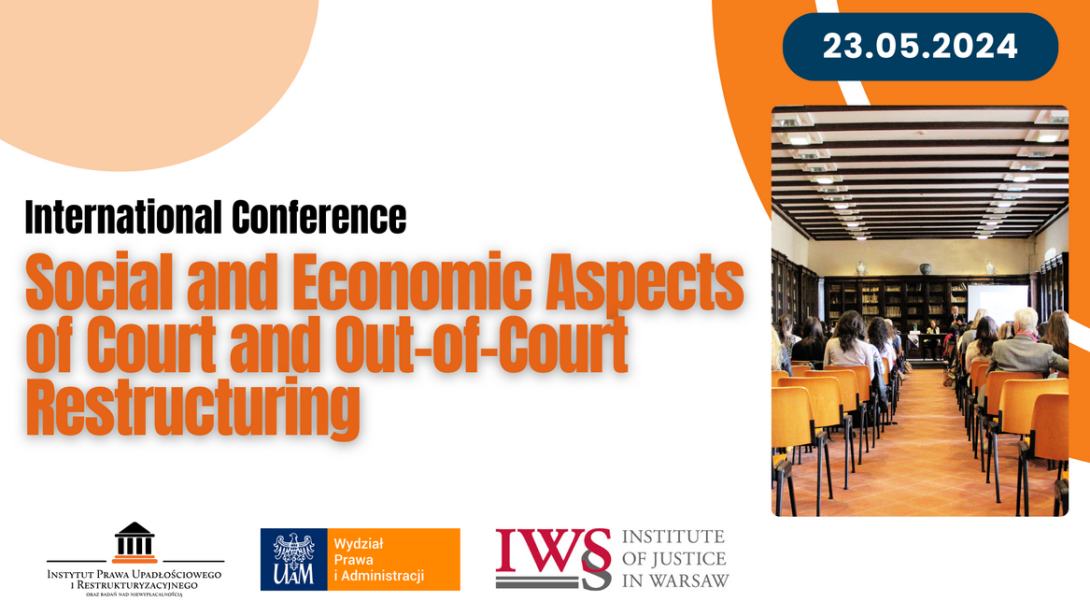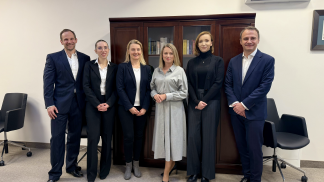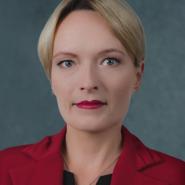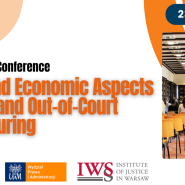Law is a social phenomenon whose form and effectiveness are determined by the socio-economic conditions of the society in which it is applied. For this reason, sometimes similar legal institutions are effective and efficient in certain jurisdictions and at the same time do not attract any interest in others. From a cognitive point of view, it is very important to study why certain legal solutions are effective in certain societies and not in others. The search for an answer to this question is one of the main objectives of the conference, the aim of which is to present the results of scientific research conducted in the field of legal, economic and sociological analysis of court and out-of-court restructuring processes. The presentation of the results of research in the field of court and out-of-court restructuring is of significant social importance due to the fact that the world economy is still struggling with the problems caused by the COVID-19 pandemic and the war in Ukraine. During the conference, papers will be presented by scientists from Europe, whose main subject of interest is restructuring and bankruptcy law.
In Poland, a significant increase in the number of pre-litigation restructuring cases occurred with the entry into force of the Act of 19 June 2020 on the simplified procedure for approval of the arrangement in connection with the occurrence of COVID-19 (i.e. Journal of Laws of 2022, item 2141), which introduced a simplified restructuring proceedings. Subsequently, some of the solutions of this act have been incorporated into the Restructuring Law. This means that the originally ad hoc and temporary solution will remain permanently in the Polish legal system. The phenomenon of pre-litigation restructuring has not been fully studied in Poland, both from a legal and socio-economic point of view. From a cognitive point of view, both the circumstances that determine the choice of such a method of restructuring and the effects of such a choice has on the socio-economic environment are important.
Conference Organizing Committee
Anna Hrycaj, PhD, Associate Professor (Lazarski University in Warsaw) – Chairperson of the Committee,
Patryk Filipiak, PhD (Adam Mickiewicz University in Poznań),
Bartosz Sierakowski, PhD (Lazarski University in Warsaw).
Scientific Council of the Conference
Anna Hrycaj, PhD, Associate Professor (Lazarski University in Warsaw),
Joanna Kruczalak-Jankowska, PhD, Associate Professor (University of Gdańsk),
Prof. Rafał Adamus (University of Opole, HUMANITAS University in Sosnowiec),
Prof. Aleksander Witosz (University of Economics in Katowice),
Patryk Filipiak, PhD (Adam Mickiewicz University in Poznań),
Bartosz Sierakowski, PhD (Lazarski University in Warsaw),
Bartosz Groele (representative of insolvency practitioners).
Contact: ipuir@lazarski.edu.pl or anna.hrycaj@lazarski.pl
Program:
Introductory lecture
10.00 a.m. – 10.20 a.m.
Resilience in Adversity: Ukraine's Journey with EU Directive 2019/1023 on Preventive Restructuring During Wartime
Oleh Mykhaliuk, EU Project Pravo-Justice (Ukraine)
Module I
10.20 a.m. – 12.30 a.m.
Moderator: Prof. Aleksander Witosz, University of Economics in Katowice (Poland)
Agnieszka Cybulska-Bienioszek, PhD, University of Economics in Katowice (Poland)
The effectiveness of restructuring proceedings and the legal culture of the society
Antisocial obstacles to the culture of restructuring
Dr Emilie Ghio, Lecturer in Corporate and Insolvency Law, School of Law, University of Edinburgh, UK., Donald Thomson, Trainee Solicitor, Thorntons LLP and Tutor in Company and Commercial Law, University of Dundee.
The rescue culture in insolvency and restructuring in England
Lord Justice Snowden, Royal Courts of Justice, London (UK)
Socio-economic aspects of Norwegian insolvency law
Sjur Swensen Ellingsæter, PhD, Associate Professor at Handelshøyskolen BI, Oslo (Norway)
The effectiveness of insolvency institutions – The Slovenian experience with the restructuring procedures
Jaka Cepec, PhD, Associate Professor, School of Economics and Business, University of Ljubljana (Slovenia)
Discussion
Module II
12.45 a.m. – 2.15 p.m.
Moderator: Joanna Kruczalak-Jankowska, PhD, Associate Professor University of Gdańsk
Monika Maśnicka, University of Gdańsk
Interests of participants of restructuring proceedings in various restructuring models
Restructuring proceedings as an instrument for repairing relations and rebuilding trust between debtor and creditors
Anna Hrycaj, PhD, Associate Professor at Lazarski University, judge at the Court of Appeal in Warsaw (Poland)
The Social and Economic Role of Banks in Restructuring Processes in Lithuania
Prof. dr Salvija Mulevičienė, Mykolas Romeris University (Lithuania)
Remigijus Jokubauska, Mykolas Romeris University (Lithuania)
Protection of the interests of a new investor in restructuring processes - the German perspective (how to effectively regulate new financing)
Prof. dr Artur Swierczok, University of Applied Science IU Internationale Hochschule (Germany)
The discharge of debt of individual entrepreneurs in EU law
Remigijus Jokubauska, Mykolas Romeris University (Lithuania)
Discussion
Module III
2.15 p.m. – 4.00 p.m.
Moderator – Patryk Filipiak, PhD, University of Poznań
Bartosz Groele
Optimising the supervision of court and out-of-court restructuring
The appointing, remuneration and supervision of trustees and administrators
in Ukraine
Iryna Butrycka, PhD, Associate Professor at the Department of Procedural Law of Yuriy Fedkovych Chernivtsi National University (Ukraine)
Insolvency Practitioner in Poland.
Bartosz Sierakowski, PhD, Lazarski University in Warsaw (Poland)
The role of the court in the restructuring proceedings
Anna Zemandlová, PhD, Masaryk University (MU), Brno (Czech Republic)
Discussion









